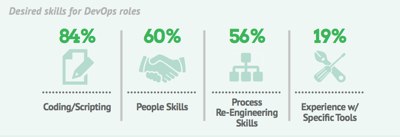Job listings mentioning “DevOps” have burgeoned over the past year or so, and people who include the term in their LinkedIn profiles and resumes are hotly pursued by tech recruiters.
For those of us who believe DevOps thinking and practices are the way to better IT and happier, more productive technology teams, this trend is both discouraging and encouraging. It’s discouraging because we don’t want to see “DevOps” become a mere buzzword, used to put a new shiny gloss on old, ineffective practices and assumptions. And it’s encouraging because it indicates a growing awareness that operations people and developers produce better software when they collaborate closely, using the tools and disciplines from both worlds.
Hiring for DevOps
In our 2013 State of DevOps survey , we asked a few questions about hiring and job titles. Half our 4,000-plus respondents said their teams consider DevOps skills when hiring. Yet just 18 percent of respondents said their organization had someone with the title “DevOps engineer.”
To us, this says that the skills someone brings to an organization are far more important than the actual title. The top three skills our  respondents said they were looking for:
respondents said they were looking for:
– Coding or scripting
– People skills
– Process re-engineering
Much lower down the list were experience with consulting or specific tools.
The most-desired skills point to what’s different about DevOps. The ability to code and script is essential for automating testing and deployment. Ditto for the ability to re-engineer processes as needed.
But without the ability to talk and work with people whose skills and experience are different from – but complementary to – yours, these technical skills mean little. DevOps is as much about collaboration and active dialogue as it is about tooling and scripting.
People with DevOps skills are highly valued, because they deliver value
One of our survey questions was about salary. The resulting data, analyzed in conjunction with data around DevOps adoption and hiring for these skills, told us that Operations people are paid more in organizations where DevOps is most mature and where these skills are considered in hiring.
That doesn’t mean people should start adding “DevOps” to their resumes and LinkedIn profiles. Without the skills – both technical and cultural – that give this word real meaning, no savvy organization will hire them, anyway. A pretender might get an interview, but any team looking to nurture its culture will interview deeply, and poseurs won’t make the cut. But people who truly can bring technical skills and cultural know-how to a team that’s striving to deliver better code, faster, through active collaboration, will be recognized.
It’s these people – and these teams – whose active collaboration and frequent use of automation deliver solid business results. Survey respondents working in high-performing teams reported deploying code up to 30 times more frequently than their peers. Their code is of higher quality: 50 percent fewer deployments fail for the best teams. Reliability is also much better — when failures do occur, service is restored in minutes, rather than hours, or even days.
Management teams are looking to deliver new services to customers, and to deliver them faster than competitors, for lower cost. Teams employing DevOps practices are doing that — and recruiters are calling the people on those teams.

James Turnbull is vice president of technical operations at Puppet Labs. He has published a number of technical books, including Pro Puppet, Pro Linux System Administration, Pro Nagios 2.0 and more. James speaks regularly at technical conferences, including OSCON, Linux.conf.au, FOSDEM, OpenSourceBridge and DevOpsDays.


